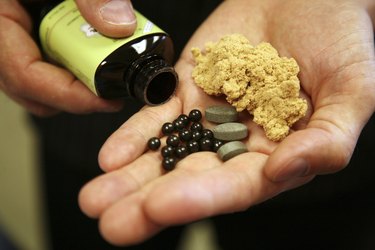
Vitamins are needed to support a healthy body. In large amounts, however, certain vitamins can be toxic, leading to a condition called vitamin toxicity or vitamin poisoning. The dosage at which toxicity occurs, and the symptoms of toxicity, depend on the vitamin.
Water-soluble vitamins, such as the B vitamins, are excreted from the body daily in urine, so excess consumption of these is generally not toxic. Fat-soluble vitamins, however, are stored in the liver and other fatty tissue; therefore, they have a higher association with toxicity.
Video of the Day
Video of the Day
To avoid health risks related to vitamin toxicity, you should adhere to the Institute of Medicine's recommended tolerable upper intake levels, or UL.
Humans obtain vitamins mainly from food and supplements, in addition to those that are synthesized in the body. While vitamin toxicity from food sources alone is unlikely, supplements can contain large amounts of vitamins, and these can be hazardous (with effects like increasing your heart rate) if not consumed under the guidance of a health care professional.
Vitamin A
Toxicity in vitamin A is known as hypervitaminosis A. Symptoms of vitamin A toxicity are mild headaches, nausea, hair loss and blurred vision. Major adverse effects of vitamin A toxicity include birth defects, liver abnormalities, reduced bone mineral density, and central nervous system disorders, according to the NIH. The UL for adults is 3,000 micrograms of vitamin A daily. The recommended daily intake, however, is just 700 micrograms for women and 900 micrograms for men.
Vitamin D
Excess vitamin D accumulates in the liver and can cause bone calcification, headaches, weakness, nausea, vomiting, constipation, kidney stones and frequent thirst and urination. Severe symptoms range from kidney damage and bone weakness to growth retardation in infants and children. The UL for vitamin D is 100 micrograms per day, and you need just 20 micrograms daily to maintain your health.
Vitamin E
Mild vitamin E toxicity has no symptoms, but severe toxicity can cause nausea and digestive problems. Patients taking anticoagulants -- "blood thiners" -- or cholesterol lowering medications should not take vitamin E supplements without consulting a physician. Because Vitamin E is a natural anticoagulant, when taken together with anticoagulant medications it can increase the risk of excessive bleeding. The UL for vitamin E is 1,000 milligrams daily -- more than 60 times the recommended daily intake of 15 milligrams.
Vitamin C and B-Complex Vitamins
Vitamin C is a water-soluble vitamin which can be toxic at very high levels. Large doses taken without food may cause indigestion. Symptoms of vitamin C toxicity include nausea, diarrhea, increased gas, headache, kidney stones and excess iron uptake. The UL for vitamin C is 2,000 milligrams daily, much larger than the 75 to 90 milligrams you need for good health. Some B-complex vitamins can cause an overdose as well. For example, excessive niacin intake can cause a burning sensation in your skin -- a "niacin flush" -- and damage your liver, while too much vitamin B-6 can cause nerve damage in some cases.